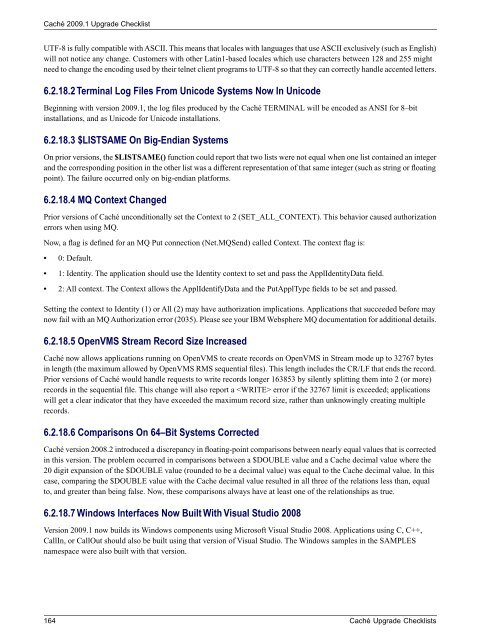Caché Upgrade Checklists - InterSystems Documentation
Caché Upgrade Checklists - InterSystems Documentation
Caché Upgrade Checklists - InterSystems Documentation
Create successful ePaper yourself
Turn your PDF publications into a flip-book with our unique Google optimized e-Paper software.
<strong>Caché</strong> 2009.1 <strong>Upgrade</strong> ChecklistUTF-8 is fully compatible with ASCII. This means that locales with languages that use ASCII exclusively (such as English)will not notice any change. Customers with other Latin1-based locales which use characters between 128 and 255 mightneed to change the encoding used by their telnet client programs to UTF-8 so that they can correctly handle accented letters.6.2.18.2 Terminal Log Files From Unicode Systems Now In UnicodeBeginning with version 2009.1, the log files produced by the <strong>Caché</strong> TERMINAL will be encoded as ANSI for 8–bitinstallations, and as Unicode for Unicode installations.6.2.18.3 $LISTSAME On Big-Endian SystemsOn prior versions, the $LISTSAME() function could report that two lists were not equal when one list contained an integerand the corresponding position in the other list was a different representation of that same integer (such as string or floatingpoint). The failure occurred only on big-endian platforms.6.2.18.4 MQ Context ChangedPrior versions of <strong>Caché</strong> unconditionally set the Context to 2 (SET_ALL_CONTEXT). This behavior caused authorizationerrors when using MQ.Now, a flag is defined for an MQ Put connection (Net.MQSend) called Context. The context flag is:• 0: Default.• 1: Identity. The application should use the Identity context to set and pass the ApplIdentityData field.• 2: All context. The Context allows the ApplIdentifyData and the PutApplType fields to be set and passed.Setting the context to Identity (1) or All (2) may have authorization implications. Applications that succeeded before maynow fail with an MQ Authorization error (2035). Please see your IBM Websphere MQ documentation for additional details.6.2.18.5 OpenVMS Stream Record Size Increased<strong>Caché</strong> now allows applications running on OpenVMS to create records on OpenVMS in Stream mode up to 32767 bytesin length (the maximum allowed by OpenVMS RMS sequential files). This length includes the CR/LF that ends the record.Prior versions of <strong>Caché</strong> would handle requests to write records longer 163853 by silently splitting them into 2 (or more)records in the sequential file. This change will also report a error if the 32767 limit is exceeded; applicationswill get a clear indicator that they have exceeded the maximum record size, rather than unknowingly creating multiplerecords.6.2.18.6 Comparisons On 64–Bit Systems Corrected<strong>Caché</strong> version 2008.2 introduced a discrepancy in floating-point comparisons between nearly equal values that is correctedin this version. The problem occurred in comparisons between a $DOUBLE value and a Cache decimal value where the20 digit expansion of the $DOUBLE value (rounded to be a decimal value) was equal to the Cache decimal value. In thiscase, comparing the $DOUBLE value with the Cache decimal value resulted in all three of the relations less than, equalto, and greater than being false. Now, these comparisons always have at least one of the relationships as true.6.2.18.7 Windows Interfaces Now Built With Visual Studio 2008Version 2009.1 now builds its Windows components using Microsoft Visual Studio 2008. Applications using C, C++,CallIn, or CallOut should also be built using that version of Visual Studio. The Windows samples in the SAMPLESnamespace were also built with that version.164 <strong>Caché</strong> <strong>Upgrade</strong> <strong>Checklists</strong>
















